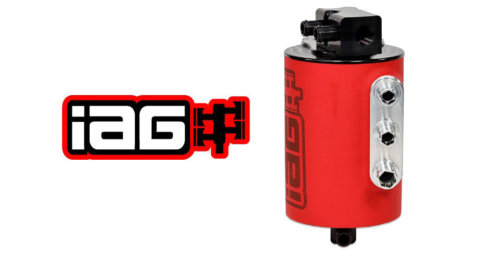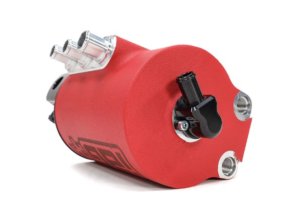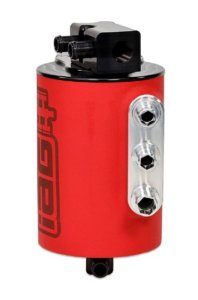Gear and Tech | News : May 12, 2021
For this article, we will look at the application of an Air Oil Separator from IAG to a 2015+ Subaru WRX featuring the FA20 engine. Some features will vary from vehicle to vehicle, but overall terms and features should be applicable between various makes/models.
What is an Air Oil Separator (AOS) and what does it do?
The AOS, sometimes called the Octopus, is meant to help during the combustion process by keeping oil vapors out of the intake tract and the engine combustion chamber.
You might be asking yourself, “Why is oil getting into the tract/combustion chamber in the first place?”
To answer that question, we need to look at the Positive Crankcase Ventilation system (PCV) which it is decades old technology. The PCV system was developed to reduce emission, crankcase pressure, oil leaks and blow-by. The PCV helps to reduce blow-by at seals and gaskets by removing crankcase gasses generated by the combustion process. The PCV from the factory is not as efficient as it should be and can allow oil to make it by the piston rings (blow-by), into the combustion chamber, thereby creating the potential for smoke, loss of power, decreased gas mileage, and even catastrophic engine failure leading to expensive repair bills.
As oil vapor makes it back into the engine, engine knock can occur. Engine knock is an audible sound that you can hear and occurs when the combustion of the piston is coupled with a combustion of oil vapors in the cylinder. This secondary combustion (that should not be there) is the “knock” that can destroy an engine.
The AOS helps to reduce blowby, creating a cleaner system and delivers oil back into the intake manifold and out of your combustion chamber.
What is a Catch Can and what does it do?
To keep this simple…think of the Catch Can doing everything that the AOS can do, but with one big difference; it catches the oil and does not recirculate it into the engine. A Catch Can requires ongoing oversight and maintenance as Can itself must be emptied.
The Octopus – Hoses and Functions
The AOS is sometimes referred to as the “Octopus” because of the multiple hoses, attached to ports, that come off the part. Ports are located on the side, top and bottom of the product.
Side – 3 ports – To relieve crankcase pressure
- Two that go to the valve cover breather ports, one on each side of the engine.
- One on the top of the block, under the intake, which is the main drain line where the oil gets redeposited.
Bottom – 1 port
- Drain Port – dumps the oil back into the port on the top of the block
Coolant Ports
- Idea is to route coolant through these to help the AOS to reach the same temperature as the engine.
- Helps to prevent condensation and water making into the
Top – 3 ports
- Two go into crank case ventilation.
- One to the new in-line PCV on the intake manifold
Summary
AOS systems can help your vehicle’s engine last longer and run cleaner. Many of our Staged Packages feature AOS products and you can read through the options, or reach out to us directly, to determine which package is right for you. National Speed can help to order and install this in no time…it’s time to get one today.




